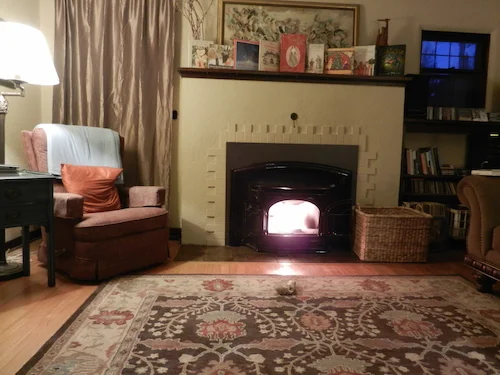 I sit for a moment in the reality of my own fortune, my own comfort, my own deep-seated needs and self centered nature. I remember the ashes, the feel of them on my forehead, gritty under Father Boyle’s thumb as he pressed them into the sign of the cross and I breathe then, one deep breath, one heavy sigh that releases shame of that milk carton moment, that column of ash moment, that slow march toward Good Friday. Carus, we are Easter people.
I sit for a moment in the reality of my own fortune, my own comfort, my own deep-seated needs and self centered nature. I remember the ashes, the feel of them on my forehead, gritty under Father Boyle’s thumb as he pressed them into the sign of the cross and I breathe then, one deep breath, one heavy sigh that releases shame of that milk carton moment, that column of ash moment, that slow march toward Good Friday. Carus, we are Easter people.
 In my writing about my friend, I embellished certain details. I filled in the holes. And as a result, if I’m honest, I’m not sure which parts of the story are true, as in truly happened, and which parts I’ve added, piece by piece, over the years. Was it my need to remember that built this parallel between his eyes and the radio? Did we really smoke pot on a park bench, en plein air, as I’ve so often recalled, or was it cigarettes? Did he hold my hand during the movie we watched together, or did I dream that, too?
In my writing about my friend, I embellished certain details. I filled in the holes. And as a result, if I’m honest, I’m not sure which parts of the story are true, as in truly happened, and which parts I’ve added, piece by piece, over the years. Was it my need to remember that built this parallel between his eyes and the radio? Did we really smoke pot on a park bench, en plein air, as I’ve so often recalled, or was it cigarettes? Did he hold my hand during the movie we watched together, or did I dream that, too?
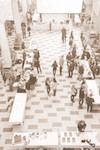 When I sat down last Friday night, I expected to hear an essay — fresh, different, perhaps unpublished — on one of his go-to topics, whether the environment, social justice concerns, or some other aspect of intentional living. Since the day I’d booked him, I’d been waiting for the moment when he’d take the stage and begin reading — his deeply rooted ethos already apparent, piercing — and then I would steal glances around the room to see the shock of recognition on the faces of my students, see the visible signs of narrative transport taking them to a new place with a master at the helm.
When I sat down last Friday night, I expected to hear an essay — fresh, different, perhaps unpublished — on one of his go-to topics, whether the environment, social justice concerns, or some other aspect of intentional living. Since the day I’d booked him, I’d been waiting for the moment when he’d take the stage and begin reading — his deeply rooted ethos already apparent, piercing — and then I would steal glances around the room to see the shock of recognition on the faces of my students, see the visible signs of narrative transport taking them to a new place with a master at the helm.
But something else happened. Not something bad, not less than . . . just different.
The Mother & Child Project
The role of the artist in society is unique. Unlike bankers, teachers, police officers, senators, doctors, or professors, artists stand at the margins of society and write poetry and prose rife with metaphor and images as a kind of prophetic voice, hopefully with a vision of truth and love. This vision can empower community, uplifting the vulnerable, and provide a newfound hope for a better life for all. The artist has the power to bend language to her will to get “between the lines” of poetry to allow what the Bible calls “true religion” to emerge. With this perspective, there is beauty, clarity, and pure advocacy.
1,000 Days
Never mind that this child is in a different country than the one for which we have been approved. Never mind that moving forward with this child will mean redoing much of our paperwork, once again driving around to banks, doctor’s offices, police departments, and myriad government buildings to get new documents printed, notarized, and certified. My friend Jill has a song that sings, “And then out of nothing, it’s telling me something I didn’t know that I knew.” There is a mysterious kind of knowing that can happen to a person, and it seems all the more sweet and supernatural when it comes to your life partner in the same time and space.
 Like any matter of taste, reading well is an exercise in preference, but as I consider the discovery of most of my favorite and abiding titles, I find that each one either came from following a strong writer, mimicking a good reader, or trusting a well-regarded “leader.” And, more often than not, the best of the best cross-check against all three!
Like any matter of taste, reading well is an exercise in preference, but as I consider the discovery of most of my favorite and abiding titles, I find that each one either came from following a strong writer, mimicking a good reader, or trusting a well-regarded “leader.” And, more often than not, the best of the best cross-check against all three!
 So, this winter, I’m finding it worthwhile — even necessary — to name the things that are saving my life. Sometimes I scribble down a list in my journal (a gift from my sister last Christmas, and itself a lifesaver). Sometimes I take the time to write a blog post, with pictures of those purple tulips or a brave blue winter sky. Most often, I’m trading daily texts with my friend Laura, both of us doing our best to find and name the things that are saving our lives. The act of naming them often becomes a lifesaver, a welcome glimpse into the brighter side of this world.
So, this winter, I’m finding it worthwhile — even necessary — to name the things that are saving my life. Sometimes I scribble down a list in my journal (a gift from my sister last Christmas, and itself a lifesaver). Sometimes I take the time to write a blog post, with pictures of those purple tulips or a brave blue winter sky. Most often, I’m trading daily texts with my friend Laura, both of us doing our best to find and name the things that are saving our lives. The act of naming them often becomes a lifesaver, a welcome glimpse into the brighter side of this world.
 It was the hardest assignment I’ve ever been given. It had to be a certain length. It had to work musically with the tone of the visuals. It had to comment on what was going on onscreen without describing it, so it had to add subtext. I loved the challenge, and I’m still really happy with the final product. Auden claimed to have written a poem in every meter style that had ever existed. And if someone came up with one he hadn’t heard of before, he’d write it down and try to create a new poem in that meter. Pure craft, right?
It was the hardest assignment I’ve ever been given. It had to be a certain length. It had to work musically with the tone of the visuals. It had to comment on what was going on onscreen without describing it, so it had to add subtext. I loved the challenge, and I’m still really happy with the final product. Auden claimed to have written a poem in every meter style that had ever existed. And if someone came up with one he hadn’t heard of before, he’d write it down and try to create a new poem in that meter. Pure craft, right?
 When I was a child, I lived in fear. Now that I’m a man, I’m learning — slowly, it sometimes seems — how to act out of love; love for my friend, love for my neighbor, love for myself. Love grounded in particulars, freed from the burden of empty rhetoric. Love that honors the dignity and complexity of every person I meet.
When I was a child, I lived in fear. Now that I’m a man, I’m learning — slowly, it sometimes seems — how to act out of love; love for my friend, love for my neighbor, love for myself. Love grounded in particulars, freed from the burden of empty rhetoric. Love that honors the dignity and complexity of every person I meet.
 The real answer is that I choose books over the internet and social media. I choose to read books rather than browse Facebook, Instagram, or Pinterest. I choose books over blogs and forums and e-mail. The answer is not finding the time, it’s choosing how to spend it. Instead of going online frequently, I put limits on my social media time in favor of moderation. At the end of the day, for me, reading a book is more edifying and better for my well-being than reading through social media posts or falling down rabbit holes online. For me, it’s about putting the phone down and choosing something else. There is enough time for things we value.
The real answer is that I choose books over the internet and social media. I choose to read books rather than browse Facebook, Instagram, or Pinterest. I choose books over blogs and forums and e-mail. The answer is not finding the time, it’s choosing how to spend it. Instead of going online frequently, I put limits on my social media time in favor of moderation. At the end of the day, for me, reading a book is more edifying and better for my well-being than reading through social media posts or falling down rabbit holes online. For me, it’s about putting the phone down and choosing something else. There is enough time for things we value.
 I have, in other words, no desire to go back in history. But I do yearn to see trees with greater clarity. I want to see them as my fellow creatures, called into existence by God, with a dignity and significance all their own. I want to realize that at the creation they were made to be trees, for God’s glory, and they have done so — it is my race of creatures that refuses to abide by God’s word. I want to know more about chlorophyll and cambium layers and see in them glimpses of glory that shine with hints of a transcendent power beyond my knowing.
I have, in other words, no desire to go back in history. But I do yearn to see trees with greater clarity. I want to see them as my fellow creatures, called into existence by God, with a dignity and significance all their own. I want to realize that at the creation they were made to be trees, for God’s glory, and they have done so — it is my race of creatures that refuses to abide by God’s word. I want to know more about chlorophyll and cambium layers and see in them glimpses of glory that shine with hints of a transcendent power beyond my knowing.
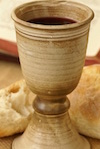 We didn't totally understand what Communion was. At least I didn’t. If it was magical to the Catholics, literally becoming body, and blood, and meaningless to atheists, a bizarre religious ritual, I suppose I fell somewhere in between. We read no books about Communion, took no classes to prepare, made no declarations of faith besides the act itself. Now I see the act is its own declaration, its own remembrance. But I didn't know then.
We didn't totally understand what Communion was. At least I didn’t. If it was magical to the Catholics, literally becoming body, and blood, and meaningless to atheists, a bizarre religious ritual, I suppose I fell somewhere in between. We read no books about Communion, took no classes to prepare, made no declarations of faith besides the act itself. Now I see the act is its own declaration, its own remembrance. But I didn't know then.
Seldom Suppress a Generous Impulse
When I was young, it struck me as strange that my father enjoyed giving so much, but years later, I am finally beginning to understand. He has become so accustomed to the thrill of working alongside his heavenly father to care for the needs of others that temporal goods have lost hold on his affections. As the earthly tent wears thin, he sees with ever increasing clarity the bountiful riches of God’s economy. One day, I hope that I will see it too.
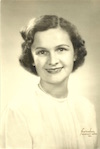 . . . so much of what Doll taught me had to do with working around missteps — my own, and others’ — with flexibility and grace. And, posthumously, that she’s redefined the meaning of hospitality for me, so that I think of it not only in its traditional sense, but also in the day-to-day as I “host” my children, their friends, my husband, and our friends and family. Doll cared for and catered to her guests. She hoped to spoil them with the best of what she had to offer — a thing that, when translated, came down to great love and a capacity to supply equal amounts of comfort and whimsy.
. . . so much of what Doll taught me had to do with working around missteps — my own, and others’ — with flexibility and grace. And, posthumously, that she’s redefined the meaning of hospitality for me, so that I think of it not only in its traditional sense, but also in the day-to-day as I “host” my children, their friends, my husband, and our friends and family. Doll cared for and catered to her guests. She hoped to spoil them with the best of what she had to offer — a thing that, when translated, came down to great love and a capacity to supply equal amounts of comfort and whimsy.
Find the Good and Praise It
Like it or not, I have been fine-tuned since childhood to feel the weight of the world’s woes more than most, perhaps like you who read the Art House America Blog (or write for it). Luci Shaw calls it the poet’s curse, this heightened sensitivity to life’s joys and sorrows. We can’t not feel what we feel. I couldn’t agree more and yet the nagging question for me comes down to this: how do we find the good and praise it in the midst of so much suffering? How do we flesh out our callings with lives of deep joy and courage? These questions haunt me year after year. I can’t promise much in the way of satisfying answers, only glimmers, a semblance of peace.
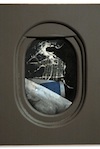 When I look back on this year, I see a deep and abiding vein of grace that has brought me to the place I am now, safe, and I am so grateful for that. But it has existed in what has seemed mostly like a nightmare, so much like a nightmare that my memories of it are fragmented and disjointed, and the images rise up out of it like terrible fish out of a black pond.
When I look back on this year, I see a deep and abiding vein of grace that has brought me to the place I am now, safe, and I am so grateful for that. But it has existed in what has seemed mostly like a nightmare, so much like a nightmare that my memories of it are fragmented and disjointed, and the images rise up out of it like terrible fish out of a black pond.
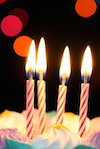 She straightened herself up, turned to face me, and put her right hand over her left — a portrait of dignity and poise. And then, with just the two of us in the room, she began to sing over me.
She straightened herself up, turned to face me, and put her right hand over her left — a portrait of dignity and poise. And then, with just the two of us in the room, she began to sing over me.
“Happy birthday to you. Happy birthday to you. Happy birthday, dear Mr. Ramsey. Happy birthday to you.”
Then she smiled, turned, and left the room.
And I wept.
 I hold Jeanne’s book in one hand and Jill’s note in the other. It’d be nice to have them both here, but holding their words is nice, too. And I have the words that fill my bookshelves. Maybe someday my words will slowly settle again onto the page. Maybe I’ll unpack my life and see what makes it work like I did with the books I studied in school. Maybe this is my next annotation.
I hold Jeanne’s book in one hand and Jill’s note in the other. It’d be nice to have them both here, but holding their words is nice, too. And I have the words that fill my bookshelves. Maybe someday my words will slowly settle again onto the page. Maybe I’ll unpack my life and see what makes it work like I did with the books I studied in school. Maybe this is my next annotation.
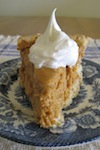 Sometimes I am frustrated with the way my denominational tribe approaches the Lord's table. (Sometimes I am frustrated with the ways single people are invisible in the church.) Occasionally I sneak off for what I call "a maintenance dose of liturgy," to a place where everything in the service builds to the table, and we literally approach it, getting up out of our seats and walking to it and holding out our hands. (Occasionally I sneak off to someplace where I expect to be invisible.) I did that a few Sundays ago.
Sometimes I am frustrated with the way my denominational tribe approaches the Lord's table. (Sometimes I am frustrated with the ways single people are invisible in the church.) Occasionally I sneak off for what I call "a maintenance dose of liturgy," to a place where everything in the service builds to the table, and we literally approach it, getting up out of our seats and walking to it and holding out our hands. (Occasionally I sneak off to someplace where I expect to be invisible.) I did that a few Sundays ago.
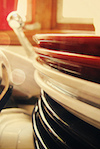 Hospitality begins with homemaking, and proper homemaking is always connected to hospitality. The slow roll of daily tasks, like scrubbing the toilets and sweeping the floors. The seasonal study of vegetables and how they might come together for a meal. The predictable safety of steady care among housemates. And then you want others — non-residents, the stranger the better — to enjoy what you enjoy. You want to extend to others whatever provisions and comforts belong to your household. Even introverts may find that it feels natural to make home in this way. Hospitality is the art of homemaking for people who don’t belong to your home.
Hospitality begins with homemaking, and proper homemaking is always connected to hospitality. The slow roll of daily tasks, like scrubbing the toilets and sweeping the floors. The seasonal study of vegetables and how they might come together for a meal. The predictable safety of steady care among housemates. And then you want others — non-residents, the stranger the better — to enjoy what you enjoy. You want to extend to others whatever provisions and comforts belong to your household. Even introverts may find that it feels natural to make home in this way. Hospitality is the art of homemaking for people who don’t belong to your home.


















